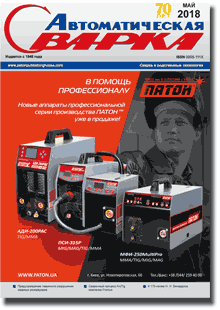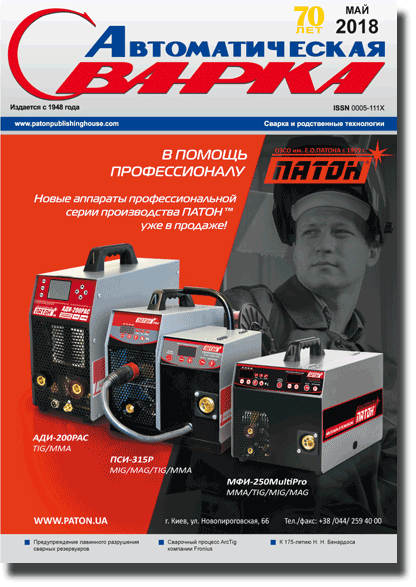| 2018 №05 (02) |
DOI of Article 10.15407/as2018.05.03 |
2018 №05 (04) |

Avtomaticheskaya Svarka (Automatic Welding), # 5, 2018, pp. 15-20
Properties of steel-copper bimetal produced by brazing in autonomous vacuum
I. P. Serebryanik, M. G. Atroshenko, M. A. Poleshchuk, A. L. Puzrin and A. V. Shevtsov
E.O. Paton Electric Welding Institute of the NAS of Ukraine. 11 Kazimir Malevich Str., 03150, Kyiv, Ukraine. E-mail: office@paton.kiev.ua
It is determined that brazing of copper on steel under conditions of autonomous vacuum in contact zone promotes formation of an area of increased microhardness, which is eliminated by standard for steel heat treatment. It is shown that content of carbon in steel does not promote significant effect on properties of copper-steel transition zone. It is stated that interaction of liquid copper with steel does not result in formation of cracks in the joint zone under conditions of brazing in autonomous vacuum. It is determined that increase of time of contact of liquid copper with steel results in formation brittle structures that decrease joint impact toughness. Fracture of steel-copper joint takes place along copper in static tensile tests. At that strength properties of brazed layer exceed reference data for deformed and annealed copper. 7 Ref., 2 Tabl., 9 Fig.
Keywords: brazing of copper on steel in autonomous vacuum, steel-copper bimetal, structure and properties of transition zone.
Received: 27.03.2018
Published: 24.04.2018
References
1. Atroshenko, M.G., Poleshchuk, M.A., Shevtsov, A.V. et al. (2015) Physical and mechanical properties of transition zone of bimetal produced by autonomous vacuum brazing of copper on steel. The Paton Welding J., 11, 52–56. https://doi.org/10.15407/tpwj2015.11.07
2. Vajnerman, A.E. (1981) Mechanism of intercrystalline penetration in surfacing of copper alloys on steel. Svarka, 6, 22–26 [in Russian].
3. Asnis, A.E., Prokhorenko, V.M., Shvindlerman, L.S. (1965) About mechanism of crack formation in welding and surfacing of copper on steel. Proizvodstvo, 11, 8–9 [in Russian].
4. Grin, A.G., Zharikov, S.V., Zalesny, D.I. (2016) Improvement of self-shielding flux-cored wire for welding of copper with steel. Vestnik Gos. Mashinostroit. Akademii, 2(16), 90–95 [in Russian].
5. Magnabosco, I., Ferro, P., Bonollo, F., Arnberg, L. (2006) An investigation of fusion zone microstructures in electron beam welding of copper-stainless steel. Sci. & Engin., A 424, 163–173.
6. GOST 1050–2013: Metal products from non-alloy structural quality and special steels. General specification [in Russian].
7. GOST 10885–85: Sheet hot rolled two-layered corrosion-resistant steel. Specification [in Russian].
The cost of subscription/purchase order journals or individual articles
| Journal/Currency | Annual Set | 1 issue printed |
1 issue |
one article |
| TPWJ/USD | 384 $ | 32 $ | 26 $ | 13 $ |
| TPWJ/EUR | 348 € | 29 € | 24 € | 12 € |
| TPWJ/UAH | 7200 UAH | 600 UAH | 600 UAH | 280 UAH |
| AS/UAH | 1800 UAH | 300 UAH | 300 UAH | 150 UAH |
| AS/USD | 192 $ | 32 $ | 26 $ | 13 $ |
| AS/EUR | 180 € | 30 € | 25 € | 12 € |
| SEM/UAH | 1200 UAH | 300 UAH | 300 UAH | 150 UAH |
| SEM/USD | 128 $ | 32 $ | 26 $ | 13 $ |
| SEM/EUR | 120 € | 30 € | 25 € | 12 € |
| TDNK/UAH | 1200 UAH | 300 UAH | 300 UAH | 150 UAH |
| TDNK/USD | 128 $ | 32 $ | 26 $ | 13 $ |
| TDNK/EUR | 120 € | 30 € | 25 € | 15 € |
AS = «Automatic Welding» - 6 issues per year;
TPWJ = «PATON WELDING JOURNAL» - 12 issues per year;
SEM = «Electrometallurgy Today» - 4 issues per year;
TDNK = «Technical Diagnostics and Non-Destructive Testing» - 4 issues per year.




